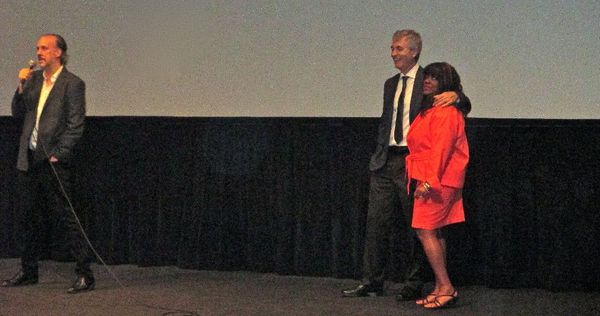Not often can you find J.C. Chandor (director of the upcoming A Most Violent Year, starring Oscar Isaac, Jessica Chastain, David Oyelowo and Alessandro Nivola), Jonathan Demme, Paul Haggis, Terence Winter and Denis Leary sitting in the same cinema and overhear Morgan Spurlock in the lobby saying that Prospect Park in Brooklyn is his favorite place, while Amy Irving looks on.
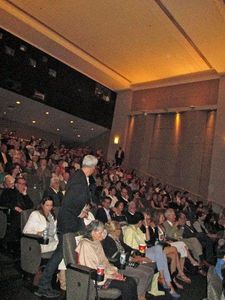 |
| Life Itself New York premiere at the Walter Reade Theater Photo: Anne-Katrin Titze |
Before the New York premiere of Life Itself with Martin Scorsese as co-executive producer, I spoke with the director Steve James, Chaz Ebert and Wes Anderson's Moonrise Kingdom narrator Bob Balaban, who will be on Broadway this fall in Edward Albee's A Delicate Balance with Glenn Close, John Lithgow and Martha Plimpton. James Brolin shared his thoughts on Roger Ebert's reaction to him playing Clark Gable opposite Jill Clayburgh's Carole Lombard. In Life Itself, Werner Herzog, Errol Morris, Ava DuVernay, Ramin Bahrani, New York Times critic A.O. Scott and Scorsese share their memories of Roger Ebert, the late Chicago Sun-Times, Pulitzer Prize-winning film critic and cultural icon.
Anne-Katrin Titze: How did you first encounter Roger Ebert? Was it a review you read?
Steve James: I saw him on television first because I was living in Southern Illinois studying film and his show was on the local station. This is before the internet, so if you didn't live in Chicago you didn't read his reviews back then.
AKT: When you saw and heard him first, do you remember which films he was talking about?
SJ: I don't. I can't possibly remember. It would have been probably around 1978, 1979, I would say. I was first struck by a question like why two guys [Ebert and film critic Gene Siskel of the Tribune] from Chicago? Because Chicago is not known as a hotbed of film criticism. But then I got it. Okay, these guys are sharp, they're entertaining, they're insightful and they don't always agree. Which is really kind of interesting.
AKT: It's the chemistry between them.
SJ: And the chemistry between them. So I became hooked on the show [Sneak Previews].
 |
| Life Itself director Steve James: "As Roger might say, the best movies celebrate life itself, right?" Photo: Anne-Katrin Titze |
AKT: You show the chemistry well in your film and make a clear point that it was not only one of them but their interplay. Was it always clear for you that you would use the title of Roger Ebert's autobiography for your film as well? Life Itself?
SJ: When I started to read Roger's memoir Life Itself, I wondered at the title of the book. It's kind of an odd title. It would have made more sense if it was "My life and movies" or some reference to movies. I think he purposefully did not want to reference movies in the title of his memoir because even though he loved movies and he saw his life sort of as this unfolding movie, what really made him distinctive was, how he lived his own life and the way with which he embraced it - every aspect of it, the good, the bad, the ugly, the hard. I think that's the life lesson and why Life Itself was a great title for his memoir and now I stole it for the movie.
AKT: Your film and its title also make you think of the connection. If you don't love life, you don't love movies.
SJ: As Roger might say, the best movies celebrate life itself, right?
Anne-Katrin Titze: Do you have a favorite review of Roger's that stuck in your mind?
Bob Balaban: I only remember bad reviews. I could quote a few bad reviews from different film critics, one or two of mine. I don't have a favorite review of Roger's. I just always enjoyed reading what he wrote. I often agreed with him. But we're not supposed to agree with film critics, we're supposed to learn something about the movie, their world view and the movie's world view. I always thought Roger was great and not just heaping praise or criticism on the movie. He let you know how he felt. He was very smart about conveying why he liked it and why he didn't. That's very useful to hear.
AKT: I'm not sure about the timing of his illness, did he ever write about Moonrise Kingdom?
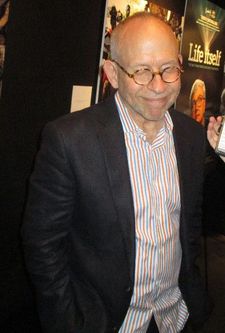 |
| Bob Balaban fondly recalling Roger Ebert: "He let you know how he felt. He was very smart about conveying why he liked it and why he didn't." Photo: Anne-Katrin Titze |
BB: No. I don't think so.
AKT: No comment about your beautiful duck shoes?
BB: No. I think we were out of the country when it opened.
AKT: You were at Cannes. Do you remember the first time you met Roger?
BB: I knew Roger and Gene [Siskel] just from seeing them everywhere. They always said hello, I talked to them, they were friendly. I had a wonderful event with Roger that I'll never forget. The Art Institute of Chicago has a film series and they gave me some kind of an award, I think it was the Roger Ebert award. Or the Gene Siskel award. And Roger, who was well at the time, maybe in the early stages, but he was primarily fine, did an event with me where for two hours he showed clips of movies I was in and he talked to me. To be interviewed by someone who knows what he knows and is so giving and has such an interesting point of view, it was such a pleasure. It was two and a half hours of the easiest thing I had ever done and I came away from it an even bigger fan.
AKT: What is coming up for you?
BB: The soonest thing is that I will be acting on Broadway in a play in the fall with Glenn Close and John Lithgow and Martha Plimpton and Lindsay Duncan and Clare Higgins. It's a revival of Edward Albee's wonderful wonderful play A Delicate Balance. We start previewing in October and I'm really looking forward to that. And I have my usual thousands of things - some television work. I'm directing a series in August called Alpha House that John Goodman stars in. We were in Monuments Men together and I love working on his show.
Anne-Katrin Titze: Do you have a favorite review of Roger's that you remember most fondly?
James Brolin: I don't. I just remember all of his reviews were pretty much spot on, totally honest from his true feelings and nobody ever paid him off for a comment. That was the best part.
AKT: When did you first become aware of him?
JB: Of him? 1975, when I played Clark Gable in Gable and Lombard and he was fascinated and came to me and wanted to hear all about my thoughts. How I had the audacity to play Clark Gable.
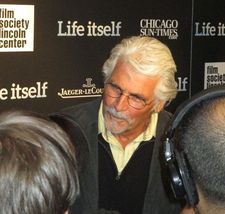 |
| James Brolin on playing Clark Gable: "he was fascinated and came to me and wanted to hear all about my thoughts." Photo: Anne-Katrin Titze |
AKT: How did you have the audacity?
JB: It wasn't me. I just got the job and said I can't do this, I can't do this and they said "yes you can" and I finally threw in the towel.
AKT: Who was your Carole Lombard?
JB: Jill Clayburgh. That led to a slew of successful pictures through the early Eighties until I took Hotel [American television series 1983-88] which was very successful, number one, on for years, but I wish I hadn't done it.
AKT: Why?
JB: Because I wanted to stay in the movie business. I love going off somewhere and doing something I've never done before.
AKT: What are you doing now?
JB: I'm doing the Tina Fey - Amy Poehler comedy movie [The Nest]. Diane Wiest and I are playing their parents and it is such a kick! We're having the best time. We'll be shooting for the next month and a half on Long Island.
Life Itself chronicles the last four months of Chaz Ebert's husband Roger's life.
Anne-Katrin Titze: It must have been difficult for you at times to go through with this film?
Chaz Ebert: I think that Steve [James] did a marvelous job.
AKT: And so did you. The film is very life affirming.
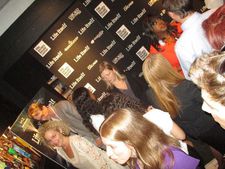 |
| Amy Irving in creme colored dress and Chaz Ebert in red for Life Itself Photo: Anne-Katrin Titze |
CE: Thank you. You know the secret ingredient? Love! When you love someone that much, you want to do everything you can for them. His love transformed me and my love transformed him.
AKT: You show so much strength in a very difficult situation. When you look at the film, aren't you amazed at yourself at times?
CE: Well, some of them are painful to watch. Particularly when I was kind of frustrated bringing him home from the hospital and he didn't want to do something that I wanted him to do. That was a little difficult, but people understand. Everybody who has anyone who is sick or going through a catastrophic illness, or has some sort of disability will understand that.
AKT: We live in a society where, if it is not occurring in your personal circle, illness and dying are pushed away. Birth, illness, death happen in the hospital and aren't discussed much.
CE: Our society turns its back on illness, on disability. We don't want to see it, we don't want to think about it too much until we're faced with it individually. In this film, Roger gives you an unblinking look at it. There's joy. He is so luminescent in this film. The twinkle in his eye never goes away. Right up until the day he died. He died with a smile on his face. You know, what more can you ask for?
 |
| Morgan Spurlock holding court, commenting that documentary filmmakers are attacked for their omissions. Photo: Anne-Katrin Titze |
Kent Jones, New York Film Festival Director of Programming and Selection Committee Chair, introduced Steve James and Chaz Ebert before the screening at the Film Society of Lincoln Center's Walter Reade Theater and recounted one of his own memories of Roger Ebert.
Kent Jones: I want to offer a brief memory from back in 1999 when I was sitting with two of my colleagues from the New York Film Festival at the Hotel Splendid in Cannes. We had a very earnest discussion about the film we had seen the night before, all very serious in heated tones. Then Roger walked into the room to have breakfast and said "Good morning intellectuals." It was a very funny moment that I remember affectionately because I always thought to myself, well, it was seven o'clock in the morning and we were having an argument about the movie we had seen the night before. But also, it raises an interesting point about Roger. He wanted cinema culture to be shared with everybody. And he did. He shared cinema with absolutely everyone. That's something we can't say about everyone. He cared about it deeply. We are very honored to show this film here.
Earlier, Morgan Spurlock commented he feels documentary filmmakers are attacked for their omissions. That critics usually don't give advice to directors and that the curse of a documentary filmmaker is that they are mostly criticized for what is not in their film instead of what is in it. "Nobody watches Iron Man and says how could there not have been a car chase in the third act? How could there not have been more guns shooting in that bank scene?"
Following the screening, Magnolia Pictures along with the Film Society of Lincoln Center, CNN Films, Film Rites, Kartemquin Films and KatLei Productions hosted a dinner at Lincoln Ristorante organized by Peggy Siegal, sponsored by Jaeger-Le Coultre.
Life Itself opens in the US on July 4.








